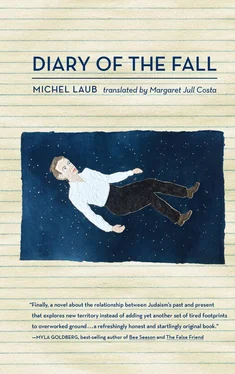25.
How long will it be before that day arrives? The day when he can no longer feed himself. Or be able to take a bath without help. And no longer know when it’s time to go to the toilet. And he’ll need to be washed and dressed and sat in an armchair and put to bed and will spend the time muttering to himself. While no one can say with any certainty when that’s going to happen, it may be that for my father the alarm bell has already sounded, and he knows that it’s time to do what needs to be done and say what needs to be said, and I think that’s why he sent me the first attachment containing his memoir.
26.
It was only the first part, twenty or thirty pages of what I imagine he will continue writing until he’s filled, who knows, a hundred, two hundred pages? Or nine hundred, given that the last half will be incomprehensible? I don’t know if that’s what he intends to do, send me another batch every month or two for me to read and perhaps comment on, because he may want me to say something about it, to understand the message it contains, as he understood the message when he read my grandfather’s notebooks, if either of those memoirs can be said to contain a message.
27.
I cried in the street. In a hotel. On a bus. In a bookshop. In the supermarket. In the park. In a spare parts depot. In a lift. At a gas station. On a viewing point from which you can see the whole city, but where no one could see me. In the shower, sitting on the floor, while the hot water collected all around me .
28.
I used to cry out of rage and shame, but I didn’t want to waste any more time talking about it. I’d talked a lot already. Or perhaps I hadn’t, but I think you understood. I wanted to consider the matter closed because it isn’t really a subject that interests you greatly. I think you’d rather know more about that other night. The music being played. The musicians all wearing dinner jackets. The room neither very big nor very small, enough I think to hold about one hundred and fifty people .
29.
Only Jews could be members of that particular club, but there were no Jewish symbols on the walls. I was wearing a tie, and it felt as if everyone in the room wanted to know if I was going to continue talking to her or turn my back. That was my main concern, what do I do now? She was sitting down. I had to bend my head a little so that she could hear me. I couldn’t speak too loudly into her ear. Or too softly. Or stand too far away. Or too close .
30.
The band began to play the next tune, and I immediately asked her to dance. She got up and I didn’t know whether to take her hand or to place my hand on her shoulder. I decided not to touch her at all. Only in the middle of the dance floor, where there were more people, did I place my hands on her waist. First one, then the other. I went to the middle of the room because that seemed the polite thing to do. Then she wouldn’t think I was trying to lead her into some dark corner. That was the first time I felt her body. I leaned closer, and we stayed there, moving in circles around the dance floor. I think that lasted about two minutes. The two of us there. I closed my eyes and preferred not to say anything. The next tune started up. Then the next. I spent four or five dances pressed close to her and saying nothing. I think that was the right thing to do and she must have liked it. That was better than pretending to be someone I wasn’t. I was so full of anger about so many things, so full of shame, but, as I said before, I don’t want to talk about that anymore. There comes a point when you get tired of even thinking about it. No one’s life can be taken up by that alone. Look at my life now, look at what’s happening to me. Is it worth going over and over it? Is it worth suffering because of it? Could I really cry about it all these years later? I prefer to remember other things, me in the middle of the dance floor with her. I wasn’t nervous anymore. The worst was over. I think the whole story began there. At least the story that’s worth telling. The one I want to talk about in this letter, or this book, however you want to call it. Everything I have to say begins there, with me in a dance hall holding your mother in my arms and saying nothing .
31.
My grandfather’s memoir can be summed up in the phrase how the world should be , and you could almost say that my father’s memoir is along the lines of how things really were , and since both are, in a way, complementary texts on the same theme, the nonviability of human experience at all times and in all places, with my grandfather immobilized by that and my father managing to move on despite it, and since it’s impossible to talk about the two without taking up a position on the subject, the fact is that, right from the start, this text has been a justification for that position.
32.
A father can’t attack his wife in front of their child. He can’t run the risk of attacking her. He can’t even think about doing anything that might make him run that risk, a glass, a sip, a drop of drink from a bottle locked in a cupboard inside a room with an iron bolt on the door, even the smell of drink within a radius of a few kilometers around the house and the street and the school and anywhere else frequented by your child until he’s strong enough to suspect that something like that might happen in some family somewhere in the world. I don’t know how things would have turned out if I hadn’t convinced myself of that on the journey to and from Porto Alegre, my third wife’s ultimatum getting mixed up with what happened on that journey, but what other subject has had more written about it than a son faced by his dying father?
33.
I wouldn’t want to tell another of those stories about how being in an extreme situation forces us to reevaluate our whole life, as if the prospect of someone close to us dying made us realize how unimportant everything else is. I wouldn’t want to use that journey to Porto Alegre, the conversations I had with my father after I’d told him about the illness, while I accompanied him when he went to have further tests, and spent the afternoons with him and cooked with him, and made sure he wasn’t left too much alone, two weeks in Porto Alegre and it was just as it used to be when I was fourteen, and we were on the beach or sitting by the barbecue, and he again asked me about my life, and it became natural again for me to confide in him, and describe to him my third wife’s ultimatum, to tell him about the drinking and the fighting and the aggression, my closest kept secret, all the things I was capable of feeling with my father there, precisely because he was there, the places and people who were dying at the very moment I discovered that I was still capable of feeling those things, the last significant conversation we had before that evolving illness made such confessions pointless, and I wouldn’t want to attribute to those days and to that conversation my decision to have a child, but looking back that’s pretty much how things happened.
34.
The nonviability of human experience at all times and in all places has the advantage of making things less painful and more amusing. It’s easy enough to scoff at the idea that someone might have decided to make his father and himself a kind of present, for both of them to live those final years differently, a father seeing his son give up drinking, give up destroying himself and others, give up his determination to die without having understood anything. Perhaps my father would be there at every stage, my third wife’s pregnancy, the first positive test, the first visit to the doctor, the first medical checks, the first time you hear the baby’s heartbeat, me telling my father what sex the child was and about my third wife’s health and the last weeks before the birth, her difficulties sleeping, the pains in her legs, her breathlessness, and those days in Porto Alegre were enough for me to see that there could be time for all those things, my father alive and conscious when the waters broke and the contractions began and my wife and I set off together to the hospital, my father holding his grandson afterward, one man and his farewell and one man and his re-beginning, the last time my father will say my name and the first time I will say yours.
Читать дальше












